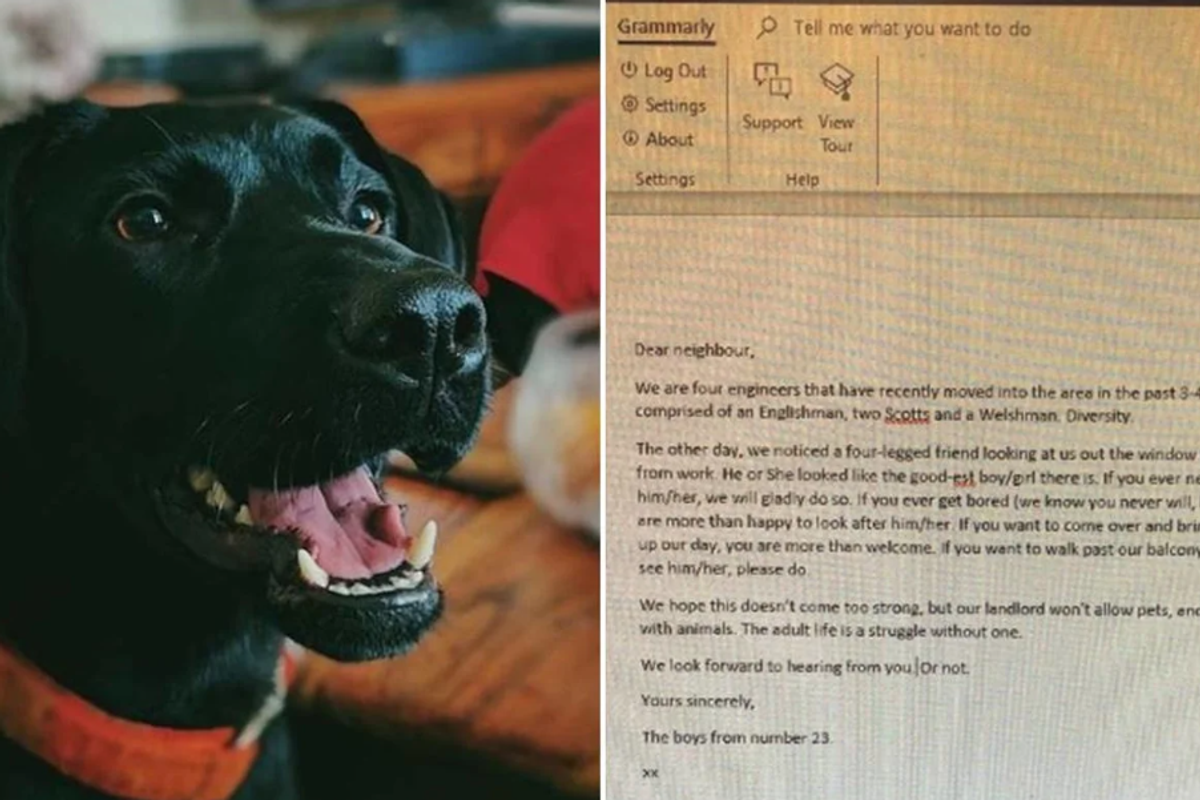Four guys asked their new neighbor if they could walk her dog. Then the dog wrote back.
"If you ever get bored, we are more than happy to look after him/her."
A black dog and a note form "the boys from number 23."
If you've lived your whole life with a dog, a home has to feel pretty empty without one. Your heart has to feel like there's something missing as well. When Jack McCrossan, originally from Scotland, moved to Bristol, England with his three friends, they were bummed out to learn that their landlord didn't allow dogs.
So when they saw a beautiful black Sheprador (a German Sheppard Lab mix) in their neighbor's window, they knew that had to become buddies with her. They wrote the dog's owner, Sarah Tolman, a letter asking to arrange a play date with the dog. "If you ever need someone to walk him/her, we will gladly do so," they wrote.
"If you ever get bored (we know you never will, but we can dream), we are more than happy to look after him/her. If you want to come over and bring him/her to brighten our day, you are more than welcome. If you want to walk past our balcony windows so we can see him/her, please do," the letter continued.
"We hope this doesn't come too strong, but our landlord won't allow pets, and we've all grown up with animals. The adult life is a struggle without one," they wrote. "Yours sincerely, The boys from number 23," the letter concluded.
Soon after, the boys in 23 received a response from the dog herself, Stevie Ticks, accepting the offer. However, it may have been written by her human, Sarah Tolman. In the letter, Stevie shares a bit about herself, saying she's two years and four months old, was adopted in Cyprus, and that she's "very friendly and full of beans." (The boys shouldn't worry about a gassy hound, in England, "full of beans" means lively.)
"I love meeting new people and it would be great if we can be friends. I must warn you that the price of my friendship is 5 x ball throws a day and belly scratches whenever I demand them," the letter continued. A few days later, the boys got to meet Stevie. "Meeting Stevie was great!" McCrossan told Buzzfeed. "She was definitely as energetic as described. We got to take her for a walk and she wouldn't stop running!"

Tolman thought the boys' letter was a fantastic gesture in an era where, quote often, neighbors are strangers. "In a day and age where people don't really know or speak to their neighbors, it was really nice for them to break down that barrier," she said. After the story went viral, she saw it as an opportunity for people to share their love of dogs with the world. "My mother and I are amazed at all the love we've received from around the world these past few days," Tolman wrote as Stevie. "If you have a doggo in your life, share that love with those around you."
A lot has changed in the past 6 years since this story warmed hearts around the globe. The boys have since moved away, but as of September 2024, Stevie is around 8 years old and still doing well. Her keeper and Sarah's partner, Chris Bowley, shared an update on Instagram. "[The boys] sadly moved out of Bristol. However, we have always tried to keep the ethos going of Stevie having as many friends and meetups as possible," Bowley wrote.
This article originally appeared six years ago.
- A man grossly misjudged how to speak to girls and got expertly handled by a Girl Scout ›
- Woman without kids cancels trip with mom friends because she's sick of hearing about babies ›
- Sisters thought they were rescuing one injured dog, but ended up with 10 perfect pups ›
- Dogs can amazingly understand our language - Upworthy ›
- After no one showed up for a puppy's first birthday party strangers on the Internet stepped in - Upworthy ›
- Family of 7 takes in 82-year-old widower neighbor as their new 'grandpa' - Upworthy ›
- Mom had perfect rebuttal for neighbor's sidewalk chalk complaint - Upworthy ›
- Neighbor sees kid 'tearing up' his driveway. People are loving the way he took action. - Upworthy ›
- Adorable pit mix gets seriously jealous after discovering his beloved vet has other patients - Upworthy ›
- 8th grader's award-winning experiment finally reveals if dog's mouths are cleaner than ours - Upworthy ›
- What your dog breed says about your personality - Upworthy ›
- 13-year-old dog grooving to his mom's piano playing is bringing pure joy in viral clip - Upworthy ›
- A new dog breed has been recognized in the United States - Upworthy ›
- Looking for a quiet dog? Experts say these 16 breeds have the fewest barks - Upworthy ›
- Woman overhears neighbor's heartfelt therapy session, only they're talking to their dog - Upworthy ›
- Four guys write a letter asking to walk their new neighbor's dog. The dog writes back. - Upworthy ›
- Service dog epically fails every single test at training school, and people love him for it - Upworthy ›
- Dog loses it in the sweetest way when owner dresses up as his favorite stuffed toy - Upworthy ›
- Man asks older neighbor to watch his pets and receives emotional and unexpected letter in return - Upworthy ›
- Stray dog who went viral over toy store teddy bear obsession just had his life changed forever - Upworthy ›
- Stranger leaves the perfect note for upstairs neighbor about their noisy cat running around - Upworthy ›

